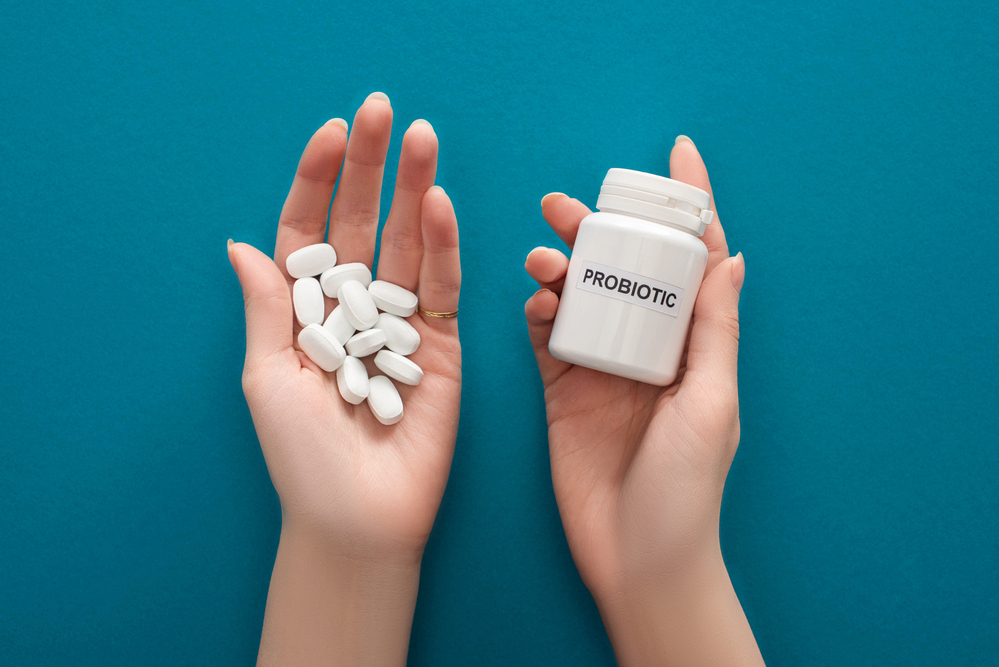New search a JAMA Psychiatry suggests that probiotics, commonly advocated for their digestive benefits, could be an invaluable tool for reducing symptoms associated with major depressive disorder (MDD).
This study, led by Viktoriya L. Nikolova of Kings College London, focused on participants whose depressive symptoms remained unaffected despite antidepressant treatment, a situation termed an incomplete response. The results revealed a notable reduction in depressive and anxious symptoms when probiotics were administered alongside their antidepressants. The authors state:
The acceptability, tolerability, and estimated effect sizes on key clinical outcomes are promising and encourage further investigation of probiotics as an adjunctive treatment for people with major depressive disorder in a definitive efficacy study.
 This research aimed to investigate whether combining probiotics with antidepressants could relieve symptoms of depression and anxiety. Forty-nine participants aged 18 to 55 were recruited from London for the randomized clinical trial. These individuals were currently on antidepressants, but their depressive symptoms remained inadequately controlled. To measure the severity of depressive and anxious symptoms, the researchers used the Hamilton Depression Rating Scale (HAMD-17), the Inventory of Depressive Symptomatology (IDS), the Hamilton Anxiety Rating Scale (HAMA), and anxiety disorder scores general (GAD-7).
This research aimed to investigate whether combining probiotics with antidepressants could relieve symptoms of depression and anxiety. Forty-nine participants aged 18 to 55 were recruited from London for the randomized clinical trial. These individuals were currently on antidepressants, but their depressive symptoms remained inadequately controlled. To measure the severity of depressive and anxious symptoms, the researchers used the Hamilton Depression Rating Scale (HAMD-17), the Inventory of Depressive Symptomatology (IDS), the Hamilton Anxiety Rating Scale (HAMA), and anxiety disorder scores general (GAD-7).
The study consisted of two groups, containing 24 and 25 participants. One group was given a probiotic treatment, while the other received a placebo. The assignment was double-blind, ensuring that neither the researchers nor the participants knew who was receiving probiotics and who was receiving a placebo. Participants provided their responses on various rating scales before the probiotic intervention and then again at 4 and 8 weeks after the intervention.
Only minor and transient gastrointestinal problems were reported as side effects in the probiotic group, underlining the tolerability of the intervention. According to the authors, this lack of adverse effects kept the blinding intact, meaning that participants and researchers remained unsure who received the probiotics and who received a placebo for the duration of the study.
Improvements in symptoms were seen in both the probiotic and placebo groups during the study. However, the probiotic group demonstrated more significant progress in reducing symptoms.
At the 4-week mark, the probiotic group achieved mean scores of 11 (HAMD-17), 30.17 (IDS), 11.71 (HAMA), and 7.78 (GAD-7) compared with 14.04, 33 .82, 14.70 and 10.91 in the control group. At eight weeks, the probiotic group achieved mean scores of 8.83 (HAMD-17), 25.04 (IDS), 8.17 (HAMA), and 7.63 (GAD-7) compared with 11.09, 29 .64, 10.95 and 9.48 in the control group.
At four weeks, 4 participants in the probiotic group were much better than 0 in the placebo group. Five in the probiotic group were much better than 4 in the placebo group. Eleven in the probiotic group were minimally improved compared with 5 in the placebo group. Four in the probiotic group had no change in their symptoms compared with 14 in the placebo group.
At eight weeks, 5 participants in the probiotic group were much better than 0 in the placebo group. Eight of each group were much improved. Nine of each group were minimally improved. 2 from the probiotic group saw no change in their symptoms compared to 5 from the placebo group.
Significantly, the authors reported a robust association between the assigned group and reduced scores on the HAMD-17 scale at week four and on the IDS scale at week 8. Reductions in anxiety symptoms, as measured by the HAMA scale, were also associated with group at intervals of 4 and 8 weeks.
The study found probiotics to be particularly effective at mitigating anxiety and somatic symptoms, which typically resist treatment with antidepressants. However, the researchers noted the need for caution given several limitations in their study. The demographics of the studies were predominantly white and exclusively from London, limiting the generalizability of the results. Furthermore, precise treatment adherence was difficult to quantify precisely.
Despite these limitations, the authors concluded on an optimistic note:
The probiotic was well tolerated, with a low dropout rate, a high adherence rate, and no serious adverse reactions. This safety and acceptability profile is better than those reported in previous studies using multiple supplements.2,3 Given the range of supplements available, clinical decisions should be guided not only by indicators of efficacy but also by safety and acceptability.
Previous research has highlighted the positive effects of probiotics on stress symptoms in mice and suggested potential benefits for mania symptoms in individuals with bipolar disorder. Additionally, probiotics have been associated with reductions in anxiety and depression in previous studies.
Conversely, antidepressants were shown to be no more effective than placebos for 85% of patients, casting doubt on their long-term utility. Other studies have suggested that these drugs are largely ineffective and potentially harmful, failing to improve quality of life, with minimal benefits against significant risks.
****
Nikolova, VL, Cleare, AJ, Young, AH, and Stone, JM (2023). Acceptability, tolerability, and estimates of putative treatment effects of probiotics as adjunctive treatment in patients with depression. JAMA Psychiatry. https://doi.org/10.1001/jamapsychiatry.2023.1817 (Link)
#Probiotics #show #promise #treatment #depression
Image Source : www.madinamerica.com